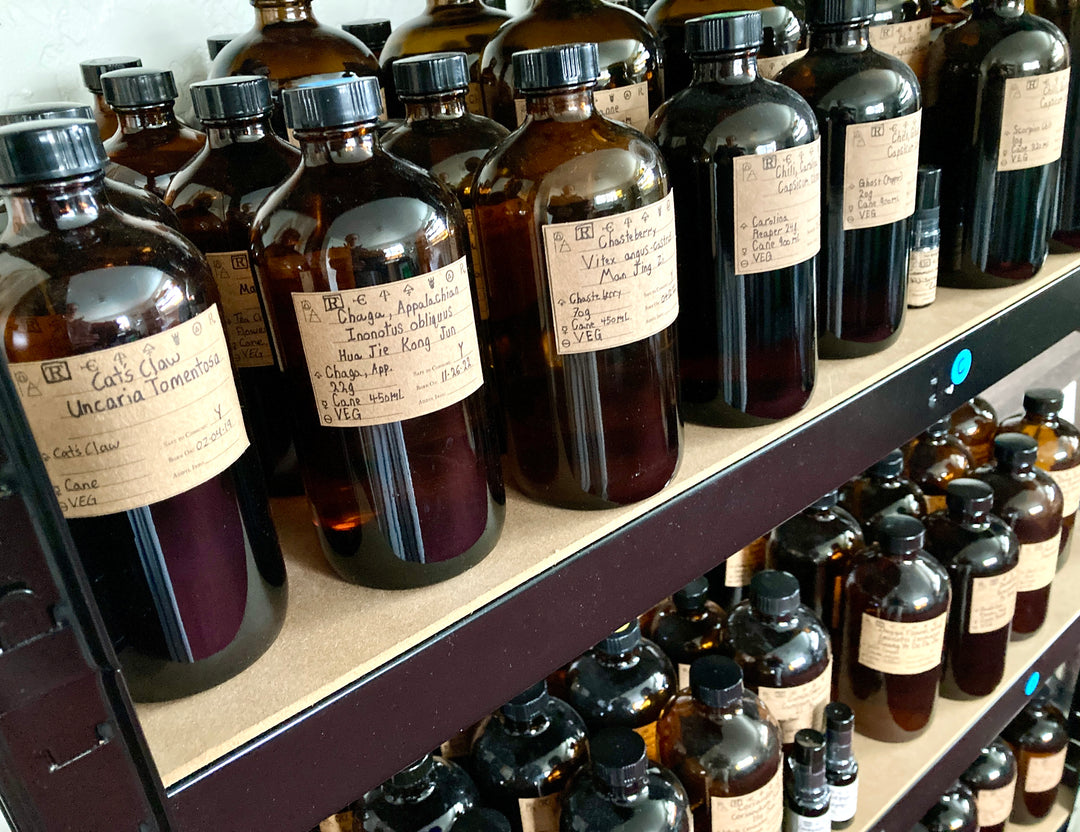What Is Calamus Root?
Acorus calamus is a perennial wetland plant native to Asia and parts of Europe and North America but can be found in temperate and subtropical regions around the world. It is also known as: Rat Root, Sweet Flag, Gladdon, or Beewort. Traditionally, the rhizome (root) is the part used medicinally, celebrated for its aromatic, bitter, and warming properties.

(image taken from: https://en.wikipedia.org/wiki/Acorus_calamus)
Traditional Uses Across Cultures:
In Ayurveda
Known as Vacha, Calamus is a rejuvenating herb for the mind and nervous system. It is used to:
-
Sharpen memory and intellect
-
Support speech and learning
-
Treat digestive and respiratory ailments
-
Calm vata imbalances (linked to anxiety and restlessness)
In Indigenous North American Traditions
Often called Rat Root, Calamus has been used by Native Americans historically for a wide variety of purposes.
Medicinal Uses
Many tribes prepared Calamus Root as a tea or decoction to treat colds, coughs, bronchitis, and sore throats. It was especially helpful for clearing congestion and easing flu-like symptoms. The root’s expectorant and antimicrobial properties made it an essential remedy for respiratory health and immune support.
For digestive issues, Calamus was chewed or brewed to relieve stomach pain, indigestion, gas, and cramping. It was also used for vomiting and diarrhea and was considered particularly effective after consuming spoiled food. Many healers used it to stimulate appetite and restore digestive balance.
Calamus Root was also used as a natural pain reliever. It was applied externally in poultices or as a wash for sore muscles, joint pain, arthritis, and inflammation. When chewed, it could relieve toothaches, menstrual cramps, and general body aches.
In wound care, the root was used as an antiseptic wash to cleanse cuts, skin infections, and sores. Its antimicrobial action helped prevent infection and speed up healing
Mental and Emotional Health
Calamus was used to enhance mental clarity and emotional stability. It was chewed to reduce anxiety, calm the nerves, and improve focus and memory. Some tribes used it to treat restlessness, nightmares, and mental fatigue. In spiritual practice, it was believed to ground the spirit and bring clarity during times of emotional distress or confusion.
Stamina and Endurance
Hunters, warriors, and travelers often chewed Calamus Root to increase stamina and endurance during long journeys. It was used to suppress hunger and thirst, improve alertness, and sustain energy. This made it especially helpful for those who needed to remain awake and clear-headed during extended periods of activity or ceremony.
Spiritual and Ceremonial Use
Many tribes regarded Calamus Root as a sacred plant. It was used in purification rituals, sweat lodge ceremonies, and vision quests. It could be burned as incense or carried as a spiritual protector to ward off negative energies and unwanted influences. Some believed it enhanced spiritual awareness and connection during ritual work.
Support for Quitting Tobacco
In some communities, Calamus was chewed as an herbal ally to help quit smoking. It helped curb cravings and provided a grounding, calming effect during withdrawal. Its bitter, aromatic flavor helped satisfy oral fixation and reduce the urge for nicotine.
~Acorus Calamus Is Not Commonly Used in Traditional Chinese Medicine (TCM)~
While Calamus Root is sometimes loosely associated with TCM, it is not a commonly used herb in the traditional Chinese pharmacopeia. Instead, TCM practitioners typically use Acorus gramineus, a closely related species, under the name Shi Chang Pu. This species is preferred due to its lower content of beta-asarone, a potentially toxic compound found in higher concentrations in some varieties of Acorus calamus. Despite the botanical similarities, these plants are not interchangeable in classical Chinese medicine, and Calamus Root itself does not have a central role in TCM protocols.
Medicinal Benefits of Calamus Root From A Western Herbalist Point of View
Mental Clarity and Cognitive Support
Calamus Root is one of the few herbs that offers mental invigoration without overstimulation. It calms the nerves while enhancing alertness, clarity, and concentration. This dual action makes it especially useful for:
-
Focus and studying
-
Reducing brain fog
-
Managing anxiety and PTSD
-
Improving memory and cognitive function
Respiratory Health
Traditionally used for colds, coughs, bronchitis, and sore throats, Calamus Root acts as an expectorant—helping to break up mucus and relieve respiratory congestion. Its anti-inflammatory properties also soothe irritated airways.
Digestive Support
Bitter and aromatic, Calamus stimulates digestion by increasing gastric secretions and improving nutrient absorption. It is helpful for:
-
Bloating and gas
-
Indigestion and sluggish appetite
-
Intestinal parasites
-
Nausea and stomach cramping
Nervous System and Energy Balance
Calamus is uniquely calming without sedating. It creates a sense of grounded vitality, making it ideal for:
-
Reducing overwhelm and nervous tension
-
Increasing endurance and energy for physical activity
-
Supporting those in addiction recovery (including smoking cessation)
(image taken from: https://www.mayernikkitchen.com/medicinal-plants/calamus)
More Recent Research Highlighting It's Benefits:
-
Antidepressant and Anxiolytic Effects: Research indicates that Acorus calamus exhibits antidepressant-like effects in animal models, suggesting its potential use in alleviating depression and anxiety. Medwin Publishers
-
Anticonvulsant Activity: The plant has demonstrated anticonvulsant properties, indicating its potential in managing seizure disorders. Plant Archives+5ijlpr.com+5Semantic Scholar+5
- SARS-CoV-2 Inhibition: Recent studies have explored the potential of Acorus calamus compounds in inhibiting key enzymes of SARS-CoV-2, suggesting a possible role in COVID-19 management. MDPI
-
Antidiabetic Activity: Research suggests that Acorus calamus may have antidiabetic properties, aiding in the management of blood sugar levels. Medtext Publications
-
Liver Protection: The plant is believed to have hepatoprotective properties, promoting liver health and assisting in detoxification processes. JSDR
- Broad-Spectrum Antimicrobial Effects: The plant exhibits antimicrobial properties against various pathogens, suggesting its potential as a natural antimicrobial agent. ScienceDirect
Safety and Considerations
Some varieties of Calamus contain beta-asarone, a compound with potential toxicity in high doses. The North American variety (Acorus calamus var. americanus) is generally considered safer due to its low to no beta-asarone content. It’s always best to work with a skilled herbalist and source high-quality, lab-tested extracts.
Pregnant or breastfeeding individuals and those with pre-existing liver conditions should avoid internal use unless guided by a practitioner.
In Summary
Modern research is beginning to affirm what ancient traditions have known for centuries: this plant holds powerful therapeutic potential. Whether supporting cognitive function, helping manage seizures, offering antimicrobial defense, or grounding the emotions during times of stress, Calamus continues to earn its place as a treasured tool in both traditional and modern herbalism.
As always, be sure to properly identify which Calamus variety you have to ensure you are using it safely and properly. In a world that often feels overstimulating, Calamus can invite us to return to the center—calm, clear, focused, and rooted.
You can try our Spagyric Tincture of Calamus Root and see what benefits you notice for yourself!









